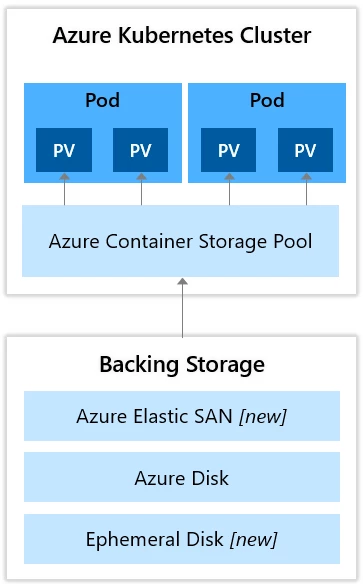Microsoft recently announced the public preview of Azure Container Storage, a volume management service built natively for containers.
Azure Container Storage provides a consistent management experience across different storage offerings, including a managed option (backed by Azure Elastic SAN), Azure Disks, and ephemeral disks on container services - intended to simplify the deployment of persistent volumes. Previously, customers had to use individual container storage interface (CSI) drivers to offer cloud storage for containers, causing various operational issues regarding application availability, performance, cost, usability, and stability.
With Azure Container Storage, customers can now easily create and manage block storage volumes for production-scale stateful container applications and run them on Kubernetes, ensuring consistent experiences across different environments. In addition, it is optimized to enhance the performance of stateful workloads on Azure Kubernetes Service (AKS) clusters by accelerating the deployment of stateful containers with persistent volumes and improving quality with reduced pod failover time through fast attach/detach.
In an Azure blog post, the authors explain that the service aligns with open-source container-native storage approaches:
Azure Container Storage runs microservices-based storage controllers in Kubernetes to abstract the storage management layer from pods and backing storage, enabling portability across Kubernetes nodes and the ability to mount different storage options.
Azure Container Storage components include:
- A storage pool: A collection of storage resources grouped and presented as a unified storage entity for your AKS cluster.
- A data services layer: Responsible for replication, encryption, and other add-on functionality absent in the underlying storage provider.
- A protocol layer: Exposing provisioned volumes via NVMe-oF protocol to application pods.

Some of the other key benefits of the service besides the consistent management experience are:
- Cost optimization: Azure Container Storage allows for dynamic sharing of provisioned resources on a Storage Pool, optimizing storage utilization and price-performance, resulting in a projected 20% total cost of ownership (TCO) saving when running a stateful Kubernetes cluster on Azure with AKS.
- Easy scaling: Azure Container Storage provides the ability to quickly scale storage according to customers’ application needs, with optimized latencies for PV creation and increased scalability limits, allowing for a more significant number of PVs to be attached to a pod, providing more flexibility in designing your application architecture without storage limitations, even for pods hosted on small AKS nodes.
- Integration with Kubernetes: Azure Container Storage offers seamless integration with Kubernetes, allowing users to leverage familiar kubectl commands for deployment, management, and automation of volume management flows while also providing Azure native user experience support through Azure Portal, CLI, and PowerShell.
Leandro Carvalho, a cloud solution architect - Support for Mission Critical at Microsoft, tweeted:
#Azure Container Storage is a game-changer for stateful apps on #AKS.
In addition, Dr. Ian McDonald, an EMEA cloud solution architect director, tweeted:
Great to see - making storage available to containers that can scale more quickly and solve issues such as high IOPS needed for small storage.
More details on Azure Container Storage are available on the documentation landing page. Additionally, it is available in the East US, West Europe, West US 2, and West US 3 regions by signing up through a short survey.
Lastly, the pricing for Azure Container Storage comprises two components: the cost of the underlying storage the customer uses and a service fee for Azure Container Storage orchestration. The details of the pricing are available on the pricing page.